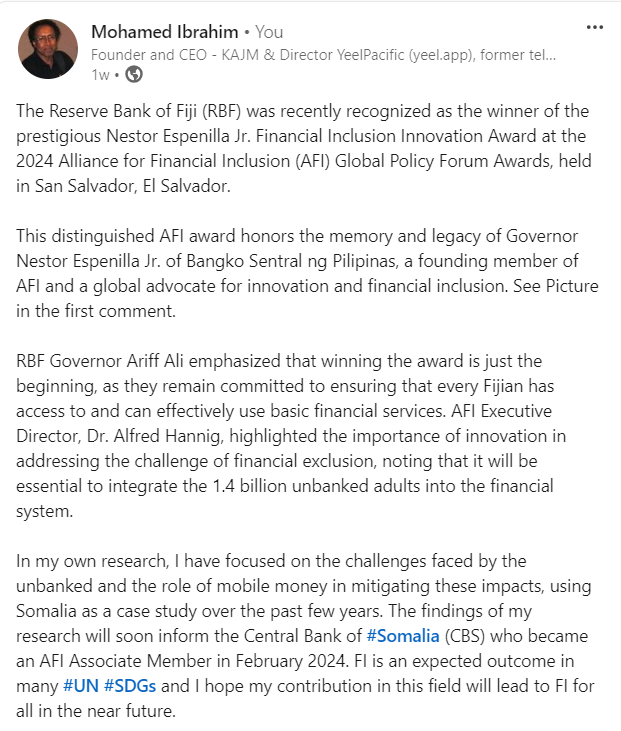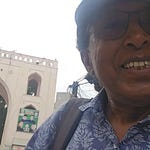Mobile money (MM) and Financial Inclusion (FI)
MM has emerged as a critical tool for enhancing FI in many parts of the world, where geographic isolation and underdeveloped financial infrastructure present significant barriers to access. In Fiji, Papua New Guinea, and Samoa have witnessed the introduction of MM services as part of broader efforts to promote FI.
This week I am looking into this and the role of money in national development. FI refers to the availability and equality of opportunities to access financial services, such as banking, credit, and insurance. The World Bank and other international organizations view FI as key to reducing poverty and achieving inclusive growth. Hence my interest in the last 4 years researching this MM and FI.
Fiji, one of the leading Pacific nations in terms of economic development, provides an exemplary case for understanding the role of MM in FI. The introduction of services such as Vodafone M-PAiSA and Digicel Mobile Money has significantly increased access to financial services for Fiji's population, particularly in rural areas. The Reserve Bank of Fiji has supported the expansion of MM services, recognizing their potential to reach unbanked and underbanked populations. I have written about this in other fora, also here1.
The ease of access to MM services, coupled with the widespread use of mobile phones, has contributed to a marked increase in FI in Fiji. As of 2020, over 40% of Fijians were reported to use MM services, a significant increase compared to previous years. Access to mobile phone and MM in Somalia is almost similar to Fiji, and yet financial exclusivity is the norm. So why MM addressed barriers to FI in Fiji and not in Somalia? The short answer is the absence of government intervention in this sector. However, more detailed answer, and my review of Vodafone M-PAiSA in Fiji, please standby over the next few weeks.
I briefly mentioned the crucial role money plays in national development in the video. I accept that Somalia’s monetary system has undergone significant reforms since the collapse of its central government in 1991. However, the absence of a competent central bank, reliance on informal money transfer systems (hawala), and unregulated MM platforms impeded structured economic development. The use of U.S. dollars in Somalia, rather than the Somali shilling, presents significant challenges for the country's economic stability and sovereignty. This dollarization undermines the value of the Somali shilling, diminishing its role as a national symbol of economic independence and complicating monetary policy.
The dollarization also disproportionately affects the rural population, who largely rely on the shilling, thereby increasing inequality between urban and rural areas. Dependence on the dollar leaves the Somali economy vulnerable to external shocks, such as changes in the value of the U.S. dollar or fluctuations in global markets. This dependency hinders the Somali government’s ability to manage the economy, perpetuating a reliance on external economic forces. As a result, the broader goal of achieving FI, long-term economic stability and growth remains elusive. Addressing this issue requires the restoration of confidence in the Somali shilling through measures such as financial reforms, the establishment of strong monetary institutions, and the gradual phasing out of the dollar in favor of local currency for domestic transactions.
Sovereignty and disappearing Islands
This week I am also sharing with you some points Peter Hartcher, the international editor of ‘TheAge’ newspaper raised, interspersed with my thoughts in this post for the Somali wantoks in Somalia and Somalis in the diaspora.
Ajay Banga, an Indian-born U.S. citizen and former Mastercard CEO, is visiting Australia and a few islands in the Pacific. He appears to be more familiar with Australia than any World Bank president since Jim Wolfensohn, who was appointed by Bill Clinton in 1995 as the "banker to the poor". However, his vision of a "liveable planet" aligns with the Bank's long-standing goal of reducing poverty while addressing environmental sustainability.
In contrast to his predecessor, David Malpass, who was appointed by Donald Trump and was known for his climate skepticism, Banga is deeply committed to addressing climate change. Appointed by the Biden administration, he has made integrating climate action a key priority of the World Bank's mission. Under his leadership, the Bank has allocated billions to climate-related projects, as he recognizes the significant threat faced by Pacific island nations, which are on the frontline of rising sea levels, and is working to coordinate investments aimed at addressing these challenges.
The Bank together with the IMF was born of the Bretton Woods conference between the western allies in the 1940s that designed the institutional architecture of the postwar period. One of the system's unwritten conventions is that the US appoints head of the world Bank, charged with lifting the poorest nations out of poverty. And the Europeans get to choose the head of the IMF, whose job is to prevent crisis-stricken countries from falling into insolvency. As Imperfect as both these Washington based institutions have been, it is often remarked that, if they didn't exit, they would need to be invented.
There are 75 developing countries receiving support from the bank's facility for the poorest nations, the so-called International Development Association, 36 countries have graduated from it. "The first recipients of IDA were Japan, Korea, India, Turkey, Mexico" Banga said. Not that the World Bank can take all the credit for their economic improvement, but it certainly gave them all ‘a leg-up’. In December 2023, Somalia reached the Heavily Indebted Poor Countries (HIPC) Initiative Completion Point, marking a significant milestone in its development. With it, Somalia achieved debt service savings of $4.5 billion and got access to critical additional financial resources that will help Somalia strengthen its economy.
Many Pacific Island are facing serious climate change related problems. And the possibility of "migration with dignity" is lately being discussed. Australia has pledged to continue to recognise the existing borders and maritime territories of some island such as Tuvalu even if they disappear entirely beneath the Pacific. The average elevation of the South West Pacific island states is one to two metres, putting them partly underwater with every storm surge.
Ref: The Age Saturday Aug 31, 2024 - Cartoon World Bank's president, Ajay Banga.
So there is a lot to learn from the Pacific region and am working on a project to encourage the development of south-south technology and knowledge transfer, in all sectors, managing climate change and MM platforms to mention just a few.
Comments, feedback as always welcome.















Share this post